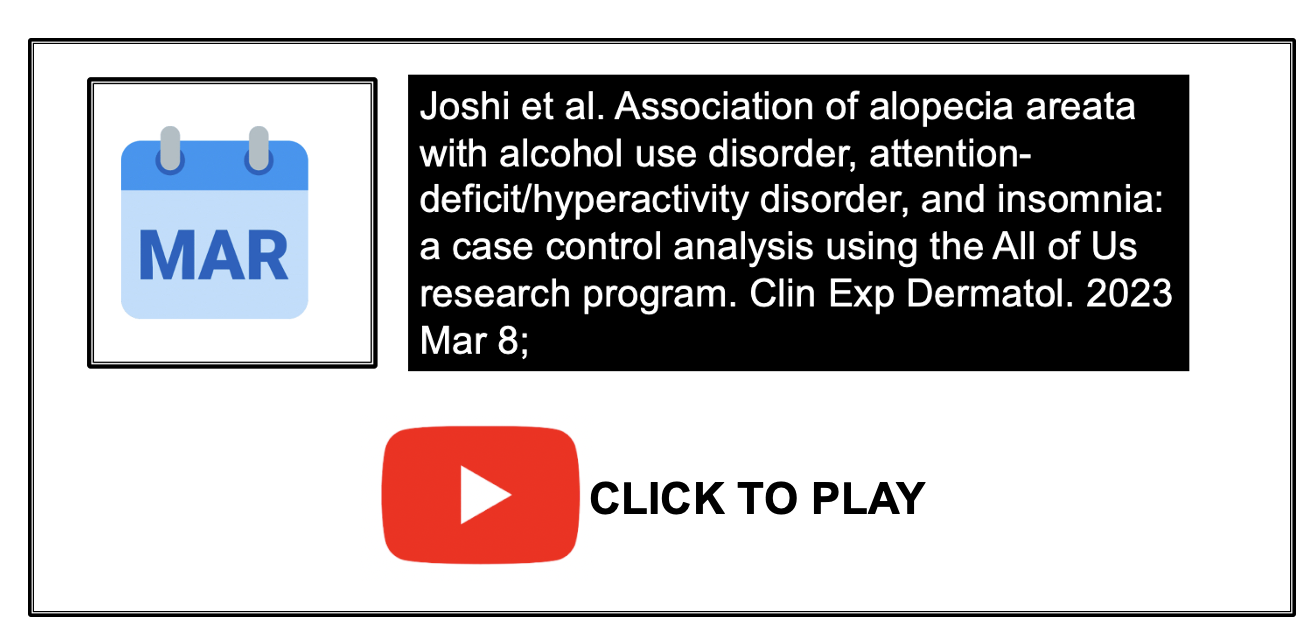Risk of Attention Deficit Hyperactivity Disorder is Increased in Those with Alopecia Areata
ADHD Risks in Patients with Alopecia Areata
Recent research in the last 4 years has highlighted an important associated between attention deficit hyperactivity disorder (ADHD) and alopecia areata. All of the details and mechanisms that govern the association have not been fully worked out yet, but it’s increasingly clear that there is a link.
In 2019, Singam and colleagues sought to determine whether AA is associated with any mental health disorders. They found there was a link and patients with ADHD had an approximately 8 fold increased risk of alopecia areata.
In 2021, Ho and colleagues set out to examine whether the risk of alopecia areata is higher in children with ADHD than in those without ADHD. They also wanted to examined the impact of methylphenidate use on AA risk in children with ADHD. Methylphenidate includes well known drugs like Ritalin and Concerta.
The authors found that the risk of alopecia areata was 30 % higher in children with ADHD than in those without ADHD. Interestingly, data showed that there appeared to be a trend towards a 40 % reduction in alopecia areata among children with ADHD who received the drug methylphenidate compared to those children who did not receive this drug; However, this difference was found to be nonsignificant.
Another study in 2021 by Meaux et al set out to determine if there is an association between attention-deficit/hyperactivity disorder (ADHD), stimulant medication (ASM) and various forms of alopecia areata..
ADHD medications examined included lisdexamfetamine, amphetamine/dextroamphetamine, dexmethylphenidate, and methylphenidate. Taken together, the authors did not find that stimulant medications increased the risk of most forms of alopecia areata like patchy alopecia areata and alopecia totalis. They found an association only between alopecia universalis and ADHD medications use (P<0.0071).
Joshi et al 2023
In 2023, Joshi et al sought to examine whether alopecia areata is associated with a variety of health issues including ADHD. They used the All of Us Data Base to search cases of alopecia areata. Cases were compared in a 1:4 manner with age-, sex-, and race/ethnicity-matched controls. The authors found a 3 fold increased risk of ADHD in patients with alopecia areata. (OR 3.03, 95% CI 2.04-4.49
Conclusion
All in all, these studies are important as they highlight the association between ADHD and alopecia areata. There seems to be a true link between ADHD and alopecia areata although the exact details of this link are not fully worked out. Patients with ADHD seem to be at about a three fold increased risk of AA. It seems to be the condition itself rather than the medications used to treat ADHD that has the closest link for most.
REFERENCE
Ho H-Y et al. Increased Alopecia Areata Risk in Children with Attention-Deficit/Hyperactivity Disorder and the Impact of Methylphenidate Use: A Nationwide Population-Based Cohort Study. Int J Environ Res Public Health. 2021 Feb 1;18(3):1286.
Joshi et al. Association of alopecia areata with alcohol use disorder, attention-deficit/hyperactivity disorder, and insomnia: a case control analysis using the All of Us research program. Clin Exp Dermatol. 2023 Mar 8;
Meaux TA et al. Association of Alopecia Areata With Attention-Deficit/Hyperactivity Disorder Stimulant Medication: A Case-Control Study. Ochsner J. 2021 Summer; 21(2): 139–142.
Singam V et al. Association of alopecia areata with hospitalization for mental health disorders in US adults. J Am Acad Dermatol . 2019 Mar;80(3):792-794.
This article was written by Dr. Jeff Donovan, a Canadian and US board certified dermatologist specializing exclusively in hair loss.

